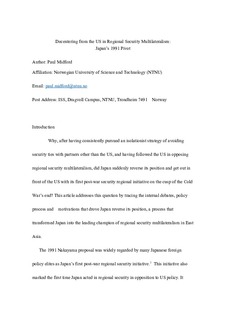| dc.contributor.author | Midford, Paul | |
| dc.date.accessioned | 2018-01-23T13:49:05Z | |
| dc.date.available | 2018-01-23T13:49:05Z | |
| dc.date.created | 2018-01-18T21:04:51Z | |
| dc.date.issued | 2017 | |
| dc.identifier.issn | 0951-2748 | |
| dc.identifier.uri | http://hdl.handle.net/11250/2479122 | |
| dc.description.abstract | This article poses the question of why, after having consistently pursued an isolationist strategy of avoiding security ties with partners other than the US, and having followed the US in opposing regional security multilateralism, did Japan suddenly reverse course and get out in front of the US with its first post-war regional security initiative. This article addresses this question by tracing the internal debates, policy process and motivations that drove Japan to reverse its position, a process that transformed Japan into the leading champion of regional security multilateralism in East Asia. | nb_NO |
| dc.language.iso | eng | nb_NO |
| dc.publisher | Taylor & Francis | nb_NO |
| dc.title | Decentering from the US in regional security multilateralism: Japan's 1991 pivot | nb_NO |
| dc.type | Journal article | nb_NO |
| dc.description.version | submittedVersion | nb_NO |
| dc.source.journal | The Pacific Review | nb_NO |
| dc.identifier.doi | 10.1080/09512748.2017.1410213 | |
| dc.identifier.cristin | 1546863 | |
| dc.description.localcode | This is an [Original Manuscript] of an article published by Taylor & Francis in [The Pacific Review] on [20 Dec 2017], available at http://www.tandfonline.com/doi/full/10.1080/09512748.2017.1410213 | nb_NO |
| cristin.unitcode | 194,67,25,0 | |
| cristin.unitname | Institutt for sosiologi og statsvitenskap | |
| cristin.ispublished | true | |
| cristin.fulltext | preprint | |
| cristin.qualitycode | 1 | |
